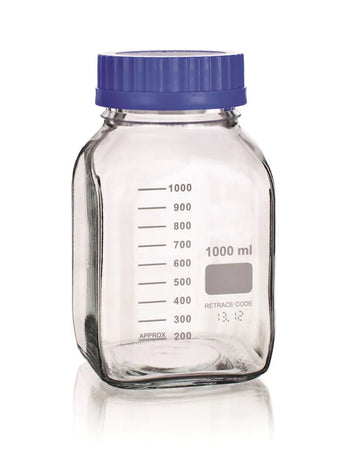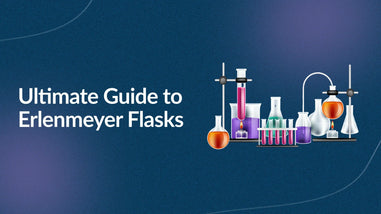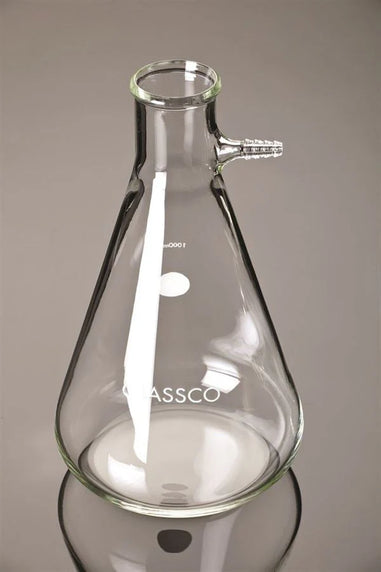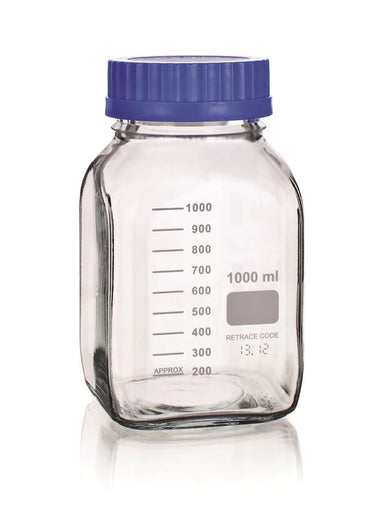- No products in the cart.
In the meticulous world of scientific research, where accuracy and reproducibility reign supreme, the role of media cannot be overstated. From cell cultures to biochemical solutions, these delicate concoctions form the lifeblood of countless experiments. But ensuring their integrity throughout storage and use requires more than just a simple container. This is where media bottles step in, playing a far more critical role than just passive containment.
The Delicate Dance of Media Storage
Media, often painstakingly prepared with specific components and precise concentrations, are susceptible to a range of threats during storage. Light exposure, temperature fluctuations, and even gas exchange can degrade their composition, rendering them useless or, worse yet, skewing experimental results. Media bottles, therefore, become the first line of defense in this delicate dance.
Material Matters: Glass vs. Plastic
The two primary materials for media bottles are glass and plastic, each offering distinct advantages and considerations. Let's delve into their unique properties:
-
Glass: The traditional choice, borosilicate glass offers unparalleled chemical resistance, making it ideal for storing harsh chemicals and solvents. Glass is also inert, minimizing interactions with the media itself. Additionally, its transparency allows for easy visual inspection of contents. However, glass can be heavy and prone to breakage, raising safety concerns.
-
Plastic: Plastic bottles, typically made from high-density polyethylene (HDPE) or polyethylene terephthalate (PETG), are lightweight, shatterproof, and often more affordable than glass. They come pre-sterilized and disposable, streamlining workflows. However, some plastics may exhibit permeability, allowing for slow gas diffusion over time, which can be detrimental to certain media. Additionally, certain chemicals can cause leaching from some plastics, contaminating the media.
Beyond Material: Design Features for Enhanced Protection
While material selection forms the foundation, innovative design features further elevate media bottles from mere containers to active safeguards. Here are some key elements to consider:
-
Light Protection: Light exposure, particularly UV rays, can degrade certain media components. Bottles with amber or opaque coloring can significantly reduce light penetration, ensuring media stability.
-
Gas Permeability: Minimizing gas exchange is crucial for some media. Closures with butyl rubber septa or integrated gas barrier layers can significantly reduce gas diffusion, maintaining a consistent environment within the bottle.
-
Sterility: Pre-sterilized, disposable bottles are a boon for aseptic techniques, particularly in cell culture applications. Alternatively, reusable glass bottles can be autoclavable for sterilization, making them a sustainable option.
-
Leakproof Closures: Secure closures with leakproof seals prevent spills and contamination, safeguarding both the media and the surrounding environment.
-
Graduated Markings: Bottles with molded graduations offer a convenient and accurate way to measure media volumes, reducing the need for additional measuring tools and minimizing the risk of introduction of contaminants.
Choosing the Right Bottle for the Job
With a diverse range of media bottles available, selecting the optimal one requires careful consideration of several factors:
-
Media Composition: The specific components within the media will influence the choice of material. For example, light-sensitive media necessitate amber or opaque bottles, while some solvents might require specific types of plastic with enhanced chemical resistance.
-
Storage Duration: Short-term storage might allow for more flexibility in material selection. However, for long-term storage, particularly when dealing with sensitive media, opting for gas-impermeable containers is crucial.
-
Sterility Requirements: Cell culture applications and aseptic techniques necessitate sterile or easily sterilizable bottles.
-
Temperature Range: Some experiments involve extreme temperatures. Ensure the chosen bottle material can withstand the intended temperature range without compromising its integrity.
-
Budget and Sustainability: Disposable plastic bottles offer convenience but can add to waste generation. Reusable glass bottles are a more sustainable option but require proper cleaning and sterilization procedures.
The Future of Media Storage: Smart Bottles
The future of media storage is brimming with innovation. The concept of "smart bottles" with integrated sensors is gaining traction. These intelligent containers can monitor temperature, pressure, and even light exposure within the bottle, providing real-time data on media integrity. This allows researchers to proactively identify potential issues and ensure the viability of their experiments.
Conclusion: More Than Just a Bottle
In conclusion, media bottles play a vital role in safeguarding the integrity of the lifeblood of scientific research. By understanding the science behind media storage, the distinct properties of glass and plastic, and the importance of design features, researchers can make informed choices about the most suitable bottle for their specific needs. As technology advances, the emergence of smart bottles promises to further revolutionize media storage, ensuring the accuracy and reproducibility of scientific endeavors.
For over 40 years, Lab Pro Inc. is your steadfast source for premium lab glassware equipment, cleanroom lab supplies, hand tools, lab equipment, chemicals, and PPE apparel. Trusted by aerospace industries, medical device companies, and laboratories globally, we epitomize exceptional quality in every product. Experience the convenience of next day service in California. Contact us online or at 888-452-2776 to explore solutions tailor-made for the laboratory industry. Elevate your experiments with Lab Pro Inc. – your partner in precision and excellence.












































